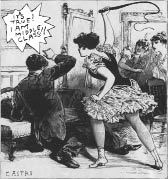The world’s greatest festival of music continues to grow under the splendid stewardship of Roger Wright, but there is always plenty of missionary work to do, for the world will never run short of grouches.
The world’s greatest festival of music continues to grow under the splendid stewardship of Roger Wright, but there is always plenty of missionary work to do, for the world will never run short of grouches. Perhaps, like Sir Harold Acton in his Tuscan grotto, who loved to ‘hunt philistines’, we should trap the blighters in cages and force them to listen to lashings of Beethoven and Wagner until they recant. Step forward, if you will, Miss Lynsey Hanley. Miss Hanley recently contributed a well-meaning but ultimately silly piece to the Guardian about the place of high culture in our national life. ‘When we talk about a cultured person,’ she said, with rather more certainty than was wise, ‘it’s clear we’re also making an inference based on class.’ Are we indeed? Others, less obsessed by social class, may argue that we’re talking about other things: taste, judgment, curiosity. It is largely true, I grant you, that most people who attend the Proms belong to the middle class. So do most people who go to theatres and opera houses, dine in good restaurants, patronise decent bookshops, visit interesting places on their holidays, and listen to Radios 3 and 4. There can be nothing more middle class than the celebrated literary festival at Hay on Wye, which is supported so enthusiastically (and hats off to them) by the Guardian.
Alan Sillitoe, who passed away earlier this year, was genuinely working class, not that he made a meal of it. He educated himself, he once said, by making good use of libraries and museums, which were available to all free of charge, and listening to great music on a wireless that cost a few bob. Sir Neville Cardus was born in the back streets of Manchester, and had little formal education. He went on to become the Manchester Guardian’s music critic, and (along with Salford-born Alistair Cooke) that newspaper’s best-known writer. So it can be done.
Every summer we praise the Proms, and every summer we are right to do so. This magnificent festival, which ends this week, really is bigger and better than anything else in the world. In its modern form, with the Chamber Proms at Cadogan Hall, and the nightly pre-concert talks at the Royal College of Music, which attract many distinguished writers and scholars, it amounts to nothing less than an Open University course, with the tuition fees paid for.
The BBC’s arts coverage is not always beyond criticism. Imagine, presented by the appalling Alan Yentob, is a dog’s dinner, and Newsnight Review is given over to show-offs with faux-proletarian voices talking about things you wouldn’t cross the road to watch. But the Proms, carried each night on Radio 3, and with many concerts screened on BBC2 and BBC4, do more for the cause of high culture than anything else in our flattened land. Too often accessibility is a synonym for mediocrity. The Proms prove that, sometimes, it can actually mean something. It has been a cracking two months. The highlight? Stephen Sondheim’s 80th birthday tribute, when the roof nearly came off.
Harold Pinter used to say that a cough in a theatre is a violent act. How much more violent is a cough in a concert hall. The person who ruined the final dying phrase in ‘Ich bin der Welt abhanden gekommen’, the last song in Mahler’s Rückert-lieder, sung beautifully by Simon Keenlyside, disgraced himself. Perhaps they should keep a set of stocks handy outside the Royal Albert Hall, so that offenders can be put in there for a day or two, to remind others of the consequences of misbehaviour.
To be fair, it was a rare example of bad manners. The Proms attract the most attentive listeners in the world, even if the late-night audience for the Chopin recital by Maria João Pires sounded at times like a sanatorium. But how can we stop the occasional clapping between movements, which breaks the spell that music, when well performed, can cast? The suggestion that people are merely showing their enjoyment is nonsense. To applaud, as many did, after Julia Fischer had played the opening meditative movement of Shostakovich’s first violin concerto is almost an offence against nature. It just shows that the clapper hasn’t been listening properly.
Silence is the most important element of music, since that is where music begins, and where it returns. That is why the greatest moments at the Proms occur when 6,000 people respect composer and performers by holding their breath. When the Berliner Philharmoniker performed Mahler’s Ninth Symphony under Claudio Abbado in 1994, 56 seconds passed before the audience breathed out. Silence: the finest sound in any concert hall.
Critics’ corner: when can ‘dazzling’ be a meaningless adjective? When somebody uses it (as one undiscriminating scribe did) to describe a Bruckner symphony. No performance of Bruckner, however superbly it is performed, can be said to dazzle, because he was too serious a composer. Stravinsky and Ravel may dazzle. Large chunks of Italian opera may dazzle, which is why so much of it is second-rate. The masters of the great Austro-German tradition do not dazzle, for dazzle is all surface, no depth. Leave the bobby-dazzlers to the sports pages. And to Newsnight Review.






Comments